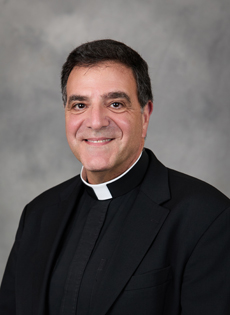
Annulment: Not a Catholic divorce
Monday, November 9, 2015
*Msgr. Michael Souckar
This October’s Synod on the Family in Rome, as well as the one before it, prompted much discussion about Catholics who are married civilly but not by the Church. This often occurs because the husband or wife was previously married. Because the Catholic Church teaches that all marriages are permanent unions lasting until death, those in a previous valid marriage are not free to marry again (Catechism of the Catholic Church, #1601-1666).
Sacred Scripture teaches that God intends the marriage bond between a man and a woman to be an unbreakable union when it says "they are no longer two, but one flesh" (Genesis 2, 24). Jesus reaffirmed the permanence and indissolubility of marriage when he said: "What therefore God has joined together let no man put asunder" (Matthew 19, 6). While the marriage bond cannot be broken (as the civil authorities claim to do by a divorce), it is possible that a marriage was entered into invalidly. If so, the person is free to marry.
While every case is unique and this can be a complicated topic, allow me to offer a few comments on how the Church might judge a marriage to be invalid. To illustrate this I will discuss two categories of possible annulment cases; there are many more.
In the first, a marriage is invalid when the bride or the groom does not truly intend marriage itself or one of its essential elements (permanence, fidelity and the possibility of children). For example, if someone married exclusively for the purpose of securing a visa to remain in this country, the marriage could be invalid because the person only used marriage for another purpose and did not intend a life-long union of love. Similarly, if a person at the time of marriage did not accept the obligation of fidelity to his/her spouse ("forsaking all others") or did not intend to be married permanently ("until death do us part"), this is not a true and binding union.
In these examples, what was actually intended by the bride or groom was contrary to what was promised in the marriage vows.
In the second category, a bride or groom who is grossly immature or not sufficiently free to choose marriage does not marry validly. In these cases, it can be judged that at the time of the wedding the bride or groom did not critically evaluate the obligations of marriage and was not able to give him/herself in marriage. For example, someone who married hastily and solely because of a pre-marital pregnancy might not have been sufficiently free to marry. Or, someone who was actively abusing and dependent on alcohol or other illicit drugs might not have been capable of entering into marriage.
In these or similar cases, either party can ask the Church to study the possible invalidity of the marriage. This process is commonly called an "annulment" because the Church is being asked to judge that the marriage is null and void. If the nullity is proven, the parties are free to marry in the Church.
It is important to state that an annulment does not deny that there was a loving relationship between the parties. In addition, the Church clearly teaches that children born of a marriage which is later declared invalid are legitimate. This is often a concern of parents who might be considering an annulment.
In the Archdiocese of Miami, the Tribunal estimates the average cost for the study of a case for annulment is $2,500 — but the subsidized fee for the faithful is $650 (payable over time and reduced for those in genuine need).
While it usually takes approximately 18 months for a final decision, the length of time varies depending on the cooperation of the parties. Some well-prepared cases have been completed in 8 months, while others have taken years due to the lack of cooperation of the parties.
Pope
Francis is establishing a new process where cases are decided by the bishop. This process can only be used when both parties participate in the
case and the nullity of the marriage is clearly evident. It is the
judicial vicar who determines if a case can be studied according to this new
process. These exceptional cases should be able to be decided fairly quickly,
perhaps within a few months. If, however, the bishop is not convinced of
the nullity of the marriage, the case is then studied according to the ordinary
process.
It is important to remember that an annulment is a judgment based on facts, not a pastoral favor to be granted. Not every case is decided in the affirmative.
If you are currently in a marriage outside the Church — whether it is your first marriage or not — I urge you and your spouse to discuss the possibility of being married by the Church. You will not only receive the grace of the Sacrament of Matrimony but also will again be free to receive Our Lord in Holy Communion.
Please pray about this. I hope that you will accept my invitation and contact your parish office to request an appointment with one of the priests or a trained advocate. Those of us who work in the Metropolitan Tribunal are here to serve you.


Comments from readers